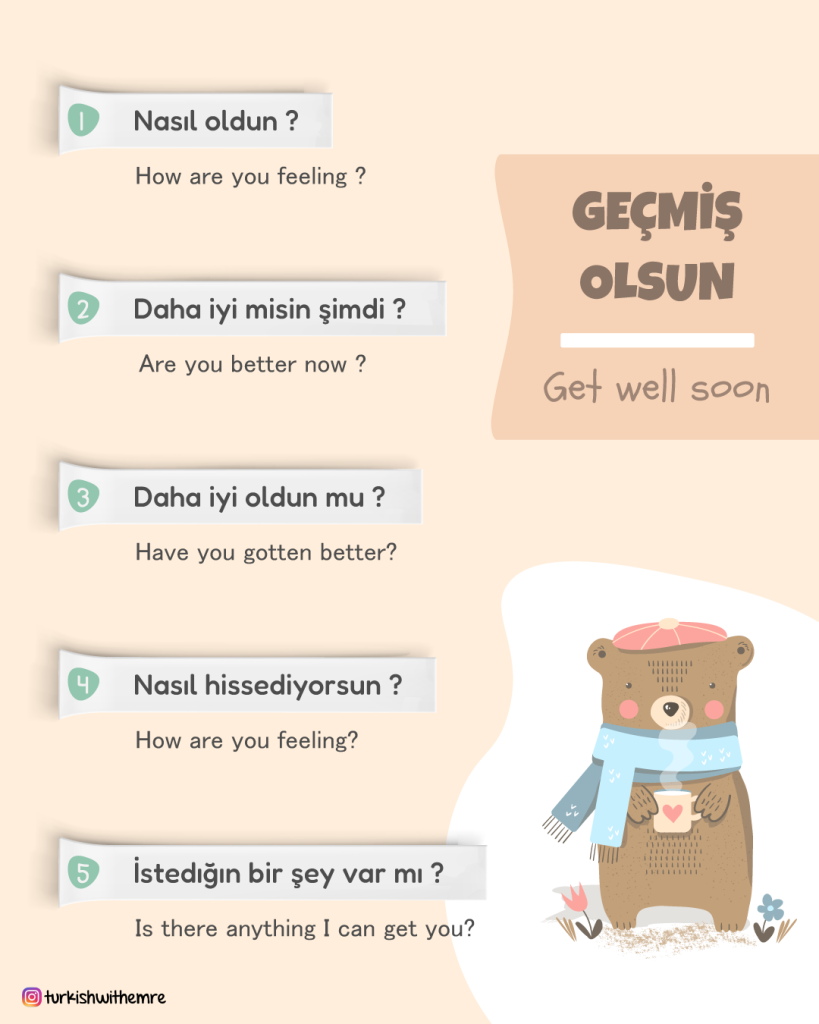Essential Phrases to Say “Get Well Soon” in Turkish
Geçmiş olsun (Get well soon) is one of the most commonly used phrases in Turkish to express concern for someone’s health and wish them a quick recovery. Whether someone is feeling under the weather or recovering from an illness, knowing how to show support in Turkish can be very comforting. In this lesson, we’ll explore essential phrases you can use when someone is unwell and how to offer help or ask about their condition in a polite and caring way.

Whether you’re a beginner or a more advanced learner, these phrases are practical and easy to use in everyday life.
1. Nasıl oldun? – How are you feeling?
This phrase directly asks how someone is feeling after being unwell. It’s a polite and considerate way to check on a friend or family member’s health.
- Example:
Türkçe: Merhaba! Nasıl oldun?
English: Hello! How are you feeling?
2. Daha iyi misin şimdi? – Are you better now?
This phrase is great for asking if there’s been any improvement in someone’s condition. It shows that you’re following up on their well-being.
- Example:
Türkçe: Daha iyi misin şimdi?
English: Are you better now?
3. Daha iyi oldun mu? – Have you gotten better?
This is a slightly different way of asking if the person is feeling better. It’s a polite way to show concern for their recovery.
- Example:
Türkçe: Daha iyi oldun mu?
English: Have you gotten better?
4. Nasıl hissediyorsun? – How are you feeling?
This phrase is very similar to “Nasıl oldun?” but emphasizes the emotional and physical state of the person. It’s more personal and can be used in both formal and informal situations.
- Example:
Türkçe: Nasıl hissediyorsun?
English: How are you feeling?
5. İstediğin bir şey var mı? – Is there anything I can get you?
Offering to help someone when they’re sick is a kind gesture. This phrase shows that you’re willing to assist in their recovery by asking if they need anything.
- Example:
Türkçe: İstediğin bir şey var mı?
English: Is there anything I can get you?
Putting It All Together: Practice Makes Perfect
Now that you’ve learned these essential phrases, try using them in a conversation or write a short dialogue. Here’s an example:
- Türkçe:
A: Nasıl oldun?
B: Daha iyiyim, teşekkürler.
A: Daha iyi oldun mu?
B: Evet, daha iyi hissediyorum.
A: İstediğin bir şey var mı?
B: Hayır, teşekkür ederim. - English:
A: How are you feeling?
B: I’m feeling better, thank you.
A: Have you gotten better?
B: Yes, I’m feeling better.
A: Is there anything I can get you?
B: No, thank you.
Tips for Practice:
- Listen and Repeat: Say each phrase aloud to get used to the pronunciation.
- Role-play: Practice these phrases with a friend or language partner. One person can play the role of someone who is unwell, and the other can ask questions using the phrases.
- Write it Down: Create your own dialogues using the phrases, or write short notes to a friend who is feeling under the weather.
Conclusion:
Learning how to express care in Turkish is a useful skill that can help you connect with others on a deeper level. These phrases are not only practical but also show your concern for someone’s well-being in a meaningful way. Try incorporating them into your daily conversations, and don’t forget to say “Geçmiş olsun!” (Get well soon!) when someone is feeling unwell.
